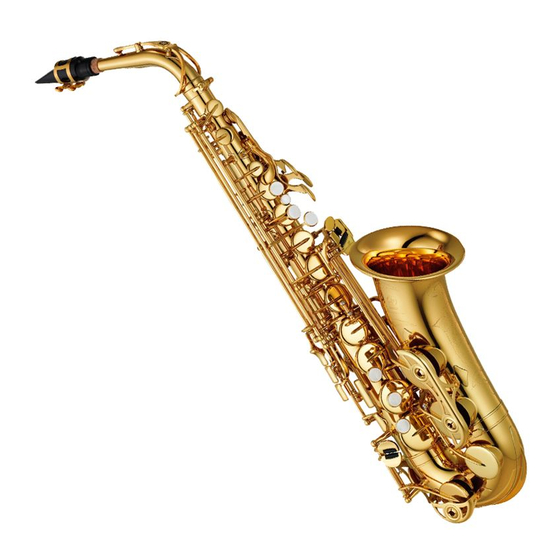Yamaha Soprano Saxophone Manuel du propriétaire - Page 9
Parcourez en ligne ou téléchargez le pdf Manuel du propriétaire pour {nom_de_la_catégorie} Yamaha Soprano Saxophone. Yamaha Soprano Saxophone 13 pages. Owner's manual

Troubleshooting
The sound is not clear or the instru-
ment plays out of tune
Take the instrument to your dealer for
repair.
The problem may be related to the pads.
• The pads may not be aligned with the tone
holes.
➞ Do not apply pressure to the keys. Also, when
placing the saxophone in the case, make sure
that there is nothing placed on the instrument.
• The pad's surface is torn.
➞ Sand or dust can easily collect on pads when
performing outdoors. Clean thoroughly after
playing.
• The pad does not open sufficiently.
➞ Excessive pressure on the keys may result in
damage to the keys or removal of the felts
under the keys, which can cause the instrument
to play out of tune. Please treat the instrument
with care.
Soldered joints become loose
Take the instrument to your dealer for
repair.
Solder can break off if the case is closed when
there is something placed on the key guards, or
from shock due to dropping the instrument,
etc. Be careful and treat the instrument with
care.
Mouthpiece is difficult to attach to the
neck
Apply some cork grease to the neck cork, and
try pushing the mouthpiece onto the neck two
or three times. Forcing the mouthpiece onto
the neck without cork grease may result in dam-
age to the cork. Make sure the cork is properly
greased.
The keys do not move or are stiff
If the key is bent, take the instrument to
your dealer for repair.
Keys can become bent if excessive force is
placed on the key mechanism, if the instrument
is dropped, or if the case is closed with some-
thing placed on the instrument.
When you're finished playing the instrument,
place it in the case making sure that there is
nothing in the case that will apply pressure to
the instrument when the case is closed. During
assembly, do not apply unnecessary pressure on
the keys. Also, be careful how you hold the in-
strument in the intervals between performance.
If a spring has become dislodged, return-
ing it to its proper position may correct the
problem.
During maintenance, a spring might become
dislodged when wiping the instrument with a
cloth. Please be careful.
The keys are noisy
Take the instrument to your dealer for
repair.
One of the following may be the source of the
problem.
• The cork or felt on the keys has fallen off,
torn, or become thin.
➞ Make sure that corks or felts have not fallen
off.
• The instrument may have been dropped
or bumped causing keys to touch or come
into contact with the body.
➞ Make sure that the instrument is placed in the
case after playing. Also, be careful how you
hold the instrument in the intervals between
performance.
• Key mechanisms are worn.
➞ To prevent keys from becoming worn, apply
key oil about once a month (1-2 drops per
place).
• The screws are loose.
➞ Woodwind instruments have many screws and
they become loose from time to time. Always
check for loose screws and tighten.
17
